The transfer of the Cossack army hetman to the Moscow service
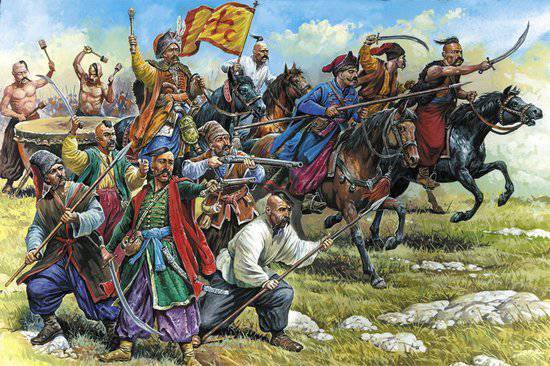
2 May 1648, the advanced Polish troops met with the troops of Khmelnitsky at the Yellow Waters. After a three-day battle, the Poles suffered a terrible defeat, and the hetmans Potocki and Kalinowski were captured. After this victory, Khmelnitsky sent out wagons calling for a revolt against the gentry, the Jews and Catholicism, after which the entire Russian population and Cossacks rose. Several “Haidamak pens” were formed, which went for a walk in all directions. During this unrest, King Vladislav died. Since the Crimean Tatars fought against Poland on the side of Khmelnitsky, Moscow was compelled, under an agreement on mutual aid, to render Poland military assistance against the Tatars in 40 thousand troops. From that moment on, the civil war in Polish Ukraine became increasingly tangled in political hypocrisy, hypocrisy, intrigue and controversy. The Tatars were forced to retreat to the Crimea, and Khmelnitsky, having lost an ally, ceased hostilities and sent ambassadors to Warsaw demanding to soften the plight of the Russian population and increase the Cossack roster to 12 000 people. Prince Vishnevetsky spoke out against the Cossack demands, and after a break the war resumed. At first, the Polish troops managed to stop the Cossack attack on Western Ukraine, but the Tatars again came to the aid of Khmelnitsky. A panic spread among the Poles that the Tatars bypassed them from the rear. The Polish commanders, succumbing to panic, left the troops and fled, followed by the troops. The prey of the Cossacks became a huge Polish wagon train and rears, and after this victory they moved to Zamost. By this time, Jan Casimir was elected king of Poland, who ordered Khmelnitsky, as a vassal of the king, to retreat from Zamost. Khmelnitsky, personally acquainted with Casimir, retreated from Zamoć and solemnly entered Kiev. Polish ambassadors arrived there for negotiations, but they ended in nothing. The war continued again and the Polish troops entered the Podolia. Khmelnitsky was at the height of glory. Khan Giray and the Don Cossacks themselves came to his aid. With these troops, the Allies laid siege to the Poles in Zbrage. To help the besieged Poles, the king approached with troops and discharged Khmelnytsky from the hetman. But Khmelnitsky courageous maneuver, without removing the siege, surrounded the king and forced to negotiate. 2 agreements were concluded, separately with the Cossacks and Tatars. Cossacks were given the same rights, the registry increased to 40000 people. Amnesty was promised to all the rebellious Cossacks, and Chigirin, the ancient capital of Cherkas and black hoods, was handed over to Khmelnitsky. Polish troops were withdrawn from all Cossack places, and women were forbidden to live there. A peace treaty was concluded with Khan, under which the king pledged to pay PLN 200 000. The Tatars, having received money and robbed the Kiev region, went to their place. In 1650, the Sejm approved the Zborovsky Treaty and the pans began to return to their Ukrainian estates and began to avenge their slaves who had robbed their estates. This caused dissatisfaction with the slaves. The number of Cossacks who wanted to serve in the register exceeded 40 thousand people and there were also dissatisfied among the Cossacks. But the main discontent caused Khmelnitsky himself, they saw in him a supporter and conductor of the Polish order. Under the pressure of these sentiments, Khmelnitsky again entered into relations with the Crimean Khan and the Turkish Sultan, promising to give support to Turkey for the support. He demanded that the lords stop repressions and fulfill the conditions of the Zborovsky Treaty. This demand aroused the indignation of the prudential lord, and it unanimously opposed it. Khmelnitsky turned to Moscow for help, which also demanded that Poland improve the situation of the Orthodox population. But Moscow was also aware of Khmelnytsky’s double-dealing and his relations with the Crimea and Turkey, and secret surveillance was established on him. In April, 1651, the fighting began. The legate of Pope Innocent brought to Poland his blessing and absolution for all the fighters against the unfaithful schismatics. On the other hand, the Metropolitan of Corinth, Josaph, surrounded Khmelnitsky with a sword consecrated at the Holy Sepulcher, and blessed the troops for the war with Poland. In conjunction with Khmelnitsky, the Crimean Khan Islam-Giray spoke, but he was unreliable, because Don Cossacks threatened him with a raid on the Crimea. The troops came together under Berestechko. In the course of a fierce battle, the Tatars suddenly abandoned their front and went to the Crimea. Khmelnitsky rushed after him and began to accuse Khan of treason, but was taken hostage at the rate of Khan and released only at the border. Returning Khmelnitsky learned that because of the treachery of the Tatars in the battle with the Poles were destroyed before the 30000 Cossacks. The Poles moved into the Cossack lands 50 thousands of troops and began to ravage the country. Khmelnitsky saw that he could not cope with the Poles, the Tatars betrayed him and he found it necessary to surrender under the patronage of the Moscow tsar. But cautious Moscow, knowing from the past about the boundless treachery of the Dnieper and their hetmans, did not rush to help Khmelnytsky and he was forced to conclude a humiliating treaty with Poland in the White Church.
- either to accept the Cossacks into citizenship and, as a result, to start a war with Poland because of this
- or to see them as subjects of the Turkish Sultan, with all the resulting geopolitical consequences.
The domination of the Poles, which followed the Belotserkovsky Treaty, and the terror they unleashed, forced the Cossacks and the people to move en masse to the left bank. Khmelnitsky again equipped ambassadors to Moscow with a request for help. But at the same time, the ambassadors of the Crimea and Turkey were constantly with him, and he had no faith. Moscow found the best for the Cossacks to be in the citizenship of the Polish king and by diplomatic methods was bothering about the rights of the Western Russian Orthodox population. The Poles responded that Khmelnitsky was sold to the Turkish sultan and accepted the Busurmanian faith. The tangled tangle of insurmountable contradictions and mutual hatred no longer allowed us to have peace in Polish Ukraine. In the summer of 1653, the Turkish embassy arrived at Khmelnitsky to take the oath from the Cossacks. But the military clerk Vyhovsky wrote: "... we no longer believe the Tatars, because they are only looking for their womb." Moscow had to make a difficult decision, because it meant a war with Poland, and the lessons of failure of the Livonian war were still fresh in the memory. To resolve the 1 issue of October, the Zemsky Sobor "of all the bureaucrats of the people" gathered in Moscow. After long debates, the council sentenced: “for the honor of the kings Michael and Alexei to stand and wage war against the Polish king. And so that hetman Bohdan Khmelnitsky and the All Zaporizhia Army, with cities and lands, the sovereign deigned to take under his arm. ” Ambassadors and troops were sent to Chigirin, and the population was to be sworn. In Pereyaslavl, the Rada was gathered and Khmelnitsky announced that he had accepted the citizenship of the Moscow Tsar.
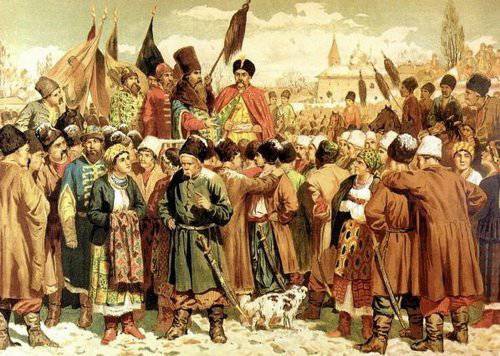
Khmelnitsky with the Cossacks took the oath, they were promised their liberties and the registry in 60 000 people. However, a strong party came up against reunification with Great Russia and was led by its prominent Ataman of the Zaporizhia Army, Ivan Sirko. He left for Zaporozhye with his comrades and did not take the oath. After the adoption of the Cossacks and the population in the citizenship of the king, Moscow inevitably was drawn into the war with Poland.
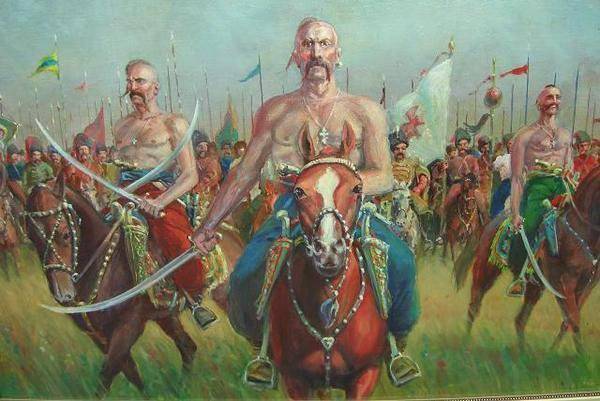
By this time, significant changes took place in the armed forces of the Moscow kingdom. Along with the formation of the army of archers, children of the boyars, nobles and Cossacks, the government began to form the troops of the "new system". Foreigners were invited to form and train them.
So already in 1631 there were: 4 colonel, 3 lieutenant colonel, 3 major, 13 captain, 24 captain, 28 ensigns, 87 sergeants, corporals and other ranks. Total 190 people are foreigners. The regiments of the new system consisted of soldiers, Reitars and dragoons. To increase the number of these troops, the government issued a decree on the compulsory recruitment of a single soldier from 3 people of the male population of the right age. By 1634, 10 regiments were formed with a total of 17 000 men, 6 soldiers and 4 reiter and dragoon regiments. In the new regiments, the number of Russian “foremen” quickly grew and already in 1639, from 744, foremen of 316 commanders were foreigners and 428 Russians, mostly from boyar children.
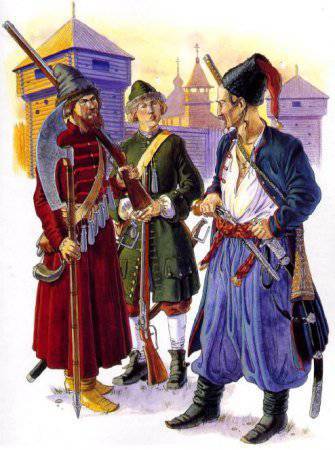
In March, 1654, on the Maiden Field in Moscow, a review of the troops took place and they went west along the Smolensk road, and Trubetskoy was ordered from Bryansk to unite with the troops of Khmelnitsky and strike at the Polish possessions. Khmelnitsky 20 sent thousands of Cossacks under the command of hetman Zolotarenko. The guard of the southern borders from the Crimean Khan was entrusted to the Don Cossacks. The war began successfully, was taken Smolensk and other cities. But with the beginning of the war, the true character of the leaders of the newly attached land was determined. Under the pretext of a threat from the Crimea, Khmelnitsky remained in Chigirin and did not come to the front. Zolotarenko at the front kept himself arrogantly and independently, did not obey the Moscow governor, but did not fail to seize the reserves prepared for the Moscow troops, finally threw the front and went to New Bykhov. The king wrote to Khmelnitsky that he was dissatisfied with his sluggishness, after which he spoke, but, having reached the Belaya Tserkov, he returned to Chigirin. From the side of Khmelnitsky and his foremen there was a complete unwillingness to reckon with the authority of the Moscow authorities. He was supported by the clergy, dissatisfied with the acceptance of the citizenship of the Moscow Patriarchate. Despite this, in 1655, Russian troops had decisive success. The international situation for Russia is clearly favorable. Sweden opposed Poland. The Swedish king Karl X Gustav was an outstanding commander and statesman and had great military forces. He utterly defeated the Polish army, occupied all of Poland, including Warsaw and Krakow. King Jan Casimir fled to Silesia. But Moscow quite rightly feared over-gaining Sweden and over-weakening Poland, and in Vilnius 1656 concluded an armistice with Poland, under which Poland returned a large part of the occupied lands. Khmelnitsky and Cossack elders were extremely dissatisfied with this decision, and most of all with the fact that they were not allowed to negotiate and did not consider their opinion. And their behavior was not surprising. The transition of the Dnieper Cossacks under the authority of the Moscow Tsar took place, on the one hand, and on the other hand, under the influence of a combination of circumstances and external causes. The Cossacks, fleeing from their final defeat by Poland, sought protection under the authority of the Moscow tsar or the Turkish sultan. And Moscow took them to keep from going under the rule of Turkey. From the side of the Moscow Tsar, the Cossacks were given their liberties, but demands were made as to a serving army. And the Cossack officers did not want to give up their privileges in the management of the army. This duality of the gentry consciousness of the Ukrainian elite was characteristic from the very beginning of the annexation of Little Russia to Great Russia, and it was not eliminated even later, and it has not yet been eradicated. It is the basis of the Russian-Ukrainian mistrust and misunderstanding that has characterized for many centuries and became the basis for numerous betrayals and excesses of the Ukrainian gentry, revolts and manifestations of separatism and collaborationism. These bad habits spread over time from the Ukrainian gentry to the wider masses. story three centuries of living together the two, and not becoming fraternal peoples, as the history of the twentieth century gave a number of examples of this situation. In the 1918 and 1941 years, Ukraine almost meekly accepted the German occupation. Only after some time, the “charm” of the German occupation led some Ukrainians to start a struggle against the occupiers, but the number of collaborators was also always large. So from 2 million Soviet people who collaborated with the Nazis during the war, more than half were citizens of Ukraine. Ideas of independence, separatism, hostility towards Muscovites (read the Russian people) constantly agitated the national consciousness of many Ukrainians under any authority. As soon as Gorbachev shook the USSR, as Ukrainian separatists and collaborators immediately and ardently picked up his destructive ideas and reinforced them with massive popular sympathy and support. It is no coincidence that it was President Kravchuk, who arrived in Belovezhye in 1991, said at the Minsk airport that Ukraine would not sign the new union treaty. And he had for this a strong legitimate basis, the decision of the All-Ukrainian referendum on the independence of Ukraine.
But back to that old story. Already with the beginning of the Polish war, Khmelnitsky and his chieftains acted completely independently of the Moscow governor and did not want to obey them. Khmelnitsky himself assured the king of loyalty, and he was looking for new allies. He set himself the broad goal of forming a federal union of the Dnieper Cossacks, the Ukrainian suburban population, Moldavia, Wallachia and Transylvania under the protectorate of the Polish king, and at the same time concluded an agreement with the Swedish king on the division of Poland. During these separate negotiations, Khmelnitsky died without finishing the matter. Death saved him from treason, so in Russian history he, the only Ukrainian hetman, is rightly revered as a national hero-unifier of two Slavic peoples. After Khmelnitsky’s death in 1657, his son Yuri, who was completely unsuitable for this role, became hetman. Among the Cossack elders began feuds, they lagged behind Poland, but did not stick to Moscow. They were divided on the left bank where Samko, Bryukhovetsky and Samoilovich dominated, holding on to the Moscow side and right bank, where the leaders were Vyhovsky, Yury Khmelnitsky, Teteria and Doroshenko, to Poland. Soon, Vyhovsky removed Yuri Khmelnitsky, gathered Rada in Chigirin and was elected hetman, but the Cossacks and some colonels did not recognize him. Thus began the thirty-year, brutal, bloody and merciless civil war in Ukraine, which received the name Ruin (devastation) in Ukrainian history. Vyhovsky began to play a double game. On the one hand, he conducted secret negotiations with Poland and the Crimea and initiated Cossacks against the presence of Moscow troops. On the other hand, he swore allegiance to Moscow and asked for permission to punish the recalcitrant Cossacks of Poltava and Zaporozhye, and he succeeded. Moscow believed him, and not Poltava Colonel Pushkar, who denounced that Vyhovsky was demolishing with Poland, the Crimea and Turkey and embarrassed the Cossacks against the Tsar, asserting that the Tsar wanted to take liberties from the Cossacks and write Cossacks as soldiers. Vyhovsky, on the other hand, declared the Poltava and Zaporozhian Cossacks to be rebels and broke them, and burned Poltava. But the betrayal came to light when, in 1658, Vyhovsky tried to dislodge Russian troops from Kiev, but was beaten off by them. Given this situation, Poland interrupted the truce and again came out against Russia in a war, but the Polish troops under the command of Gonevsky were defeated, and he himself was taken prisoner. However, in June 1659 of the year Vyhovsky, in alliance with the Tatars and Poles, arranged for the Russian troops under the command of Prince Pozharsky a tailgate at Konotop and severely beat him. But the Cossacks and their allies still did not have unity. Yuri Khmelnitsky with the Cossacks attacked the Crimea and the Tatars hastily left Vyhovsky.
Cossacks were in conflict with each other and with the Poles. Polish commander Potocki informed the king: “... do not please your royal favor to expect anything good from the local region for yourself. All residents of the western side of the Dnieper will soon be Moscow, because they will overpower their eastern side. ” And it is true that soon the Cossack colonels left Vyhovsky one by one and swore allegiance to the Tsar of Moscow. October 17 1659 was convened in Pereyaslavl, a new Parliament. Yuri Khmelnitsky was again elected hetman by both sides of the Dnieper, he and the foremen took the oath of office in Moscow. Part of the Cossacks expressed dissatisfaction with the decisions of the Rada and Colonels Odinets and Doroshenko went to Moscow with a petition, namely:
- To Moscow troops were withdrawn from everywhere except Pereyaslavl and Kiev
- That the court was decided only by local Cossack authorities
- For the Kiev Metropolitan to submit not to the Moscow, but to the Byzantine Patriarch
Some of these requirements were met. However, the new accession of the Cossacks to Moscow prompted the Crimea and Poland to an alliance, after the conclusion of which they began military operations. Small Russian troops stationed in Ukraine under Sheremetyev’s command were besieged in Chudov. The Cossacks, immediately upon the approach of the Poles and the Crimeans, entered into negotiations with them and swore allegiance to the Polish king. Seeing all kinds of treason, Sheremetyev was forced to surrender and went to the Crimea as a prisoner. Miraculous defeat was even more severe than Konotop. Young and capable voevody died, and most of the army destroyed. The Dnieper Cossacks again went to the service of the Polish king, but he no longer had any faith, and he immediately took them to the “fry”, making it clear that the freemen was finished. Right-bank Ukraine was subjected to terrible devastation by the Poles and Tatars, and the population was turned into a serf of Polish landlords. After the defeat in Chudov, Russia did not have enough troops to continue the struggle in Ukraine and she was ready to let her go. Poland did not have the money to continue the war. Left Bank and Zaporozhye were left to themselves, with varying success fought off the Tatars, but because of the strife could not elect a hetman. The reconciliation in Ukraine did not occur, the Cossack officers fiercely intrigued among themselves and rushed between Moscow, Poland, the Crimea and Turkey. But they had no faith anywhere. Under these conditions, in the 1667, the Andrusovo peace was concluded between Moscow and Poland, according to which Ukraine was divided by the Dnieper, its eastern part came into the possession of Moscow, and the western part - to Poland.
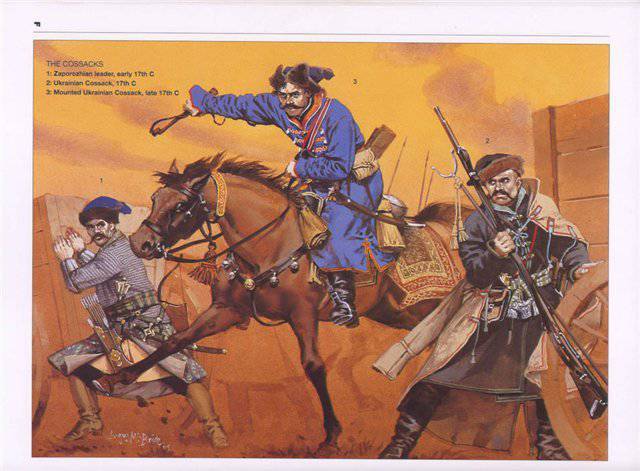
In Muscovy at that time, there was also restlessness, there was a Razin revolt. Simultaneously with the rebellion of Razin in Ukraine no less important events took place. The division of the Dnieper in the Andrusovo world caused strong discontent of all layers of the Dnieper population. Confusion and vacillation reigned in the country. On the right bank of Chigirin, hetman Doroshenko declared himself a subject of the Turkish Sultan. In the left bank, Bryukhovetsky, having received boyars and estates from the tsar, began to reign uncontrollably, but continued to play a double game with respect to Moscow. In the western side was the third hetman Honenchko, a supporter and protege of Poland. Zaporozhye rushed and did not know where to stick. The Kiev Metropolitan Methodius became the enemy of Moscow. All the opponents of Moscow finally gathered the secret Rada in Gadyach, but the whole matter was hampered by the strife inside the Ukrainian gentry. Nevertheless, the Rada decided to unite by all parties, to enter into the citizenship of the Turkish Sultan and to go to the lands of Moscow together with the Crimeans and the Turks, and Doroshenko also demanded to go to the Poles. Bryukhovetsky ultimatum demanded the withdrawal of Moscow troops from the left bank. From Gadyach to Don, a letter was written in which it was written: “Moscow with the Poles decided to destroy the glorious Army of Zaporozhskoye and Don and completely destroy it. I ask and I warn you, do not be enticed by their treasury, but be in fraternal union with Mr. Stenka (Razin), as we are with our Zaporozhye brethren. ” Another Cossack insurrection rose up against Moscow, and together with it all the surrounding demons gathered. Tatars came to the aid of the Dnieper and the Moscow troops left not only the left-bank Ukraine (Hetmanate), but also some of their cities. As a result of Bryukhovetsky's treason, 48 cities and townships were lost. But Doroshenko, who said “Bryukhovetsky is thin and Cossack, he is not natural,” rose against Bryukhovetsky. The Cossacks did not want to defend Bryukhovetsky and he was executed. But Doroshenko was called the hetman of His Majesty Khan and the authority of the Cossacks for his citizenship to the Sultan.
The ferment and troubles with the participation of many hetmans, various atamans, Tatars, Turks, Poles, Muscovites continued until the 1680-ies, until the Cossack colonel Mazepa made a proposal to Moscow to streamline the defense of the Hetmanate. He advised to increase the number of troops, but to reduce the number of governors, who by their troubles with each other spoil the general order. The young talent was noticed by Moscow, and after hetman Samoilovich was arrested on charges of treason, Mazepa was elected to his place in 1685 year. Soon the eternal peace was concluded with Turkey and Poland. It was in such the hardest internal and external conditions of the Ukrainian turmoil that the Cossack troops of the Hetmanate took over the Moscow service.
Mazepa successfully hetman nearly a quarter of a century and his hetmanship was very productive for Moscow and the Cossacks. He managed to stop the civil war (ruin), to preserve the great Cossack autonomy, to pacify the Cossack sergeant and put it in the service of the Moscow kingdom. He also managed to instill in the Moscow authorities great confidence in himself and his work was highly valued. But Mazepa, like his predecessors, was addicted to dependence on the Moscow tsar and concealed the hope of escaping and establishing military independence. Mazepa, having the confidence of the Cossacks and the Moscow government, outwardly expressed submissiveness and waited for an opportunity. The tremendous treason of Mazepa and the Zaporizhzhya Cossacks on the eve of the Poltava battle encouraged Tsar Peter to defeat the Dnieper Cossacks coolly and mercilessly. Later, during the “Indian rule” it was partially reanimated. However, Petrovsky lesson did not go in store. In the second half of the 18th century, a fierce and uncompromising struggle of Russia unfolded for Lithuania and Black Sea coast. In this struggle, the Dnipro people showed themselves again unreliably, rebelled, many treacherously changed and ran to the enemy camp. The cup of patience overflowed and in 1775, by the decree of Empress Catherine II, the Zaporizhian Sich was destroyed, as expressed in the decree, “as a godless and unnatural community, not suitable for the extension of the human race”, Izyumok, Akhtyrsky and Kharkov. But this is a completely different and rather tragic story for the Dnieper Cossacks.
Gordeev A.A. History of the Cossacks
Istorija.o.kazakakh.zaporozhskikh.kak.onye.izdrevle.zachalisja.1851.
Letopisnoe.povestvovanie.o.Malojj.Rossii.i.ejo.narode.i.kazakakh.voobshhe.1847. A. Rigelman
Information